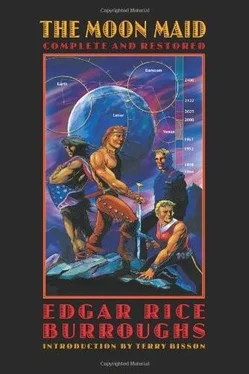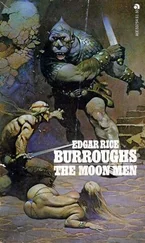Edgar Burroughs - The Moon Maid
Здесь есть возможность читать онлайн «Edgar Burroughs - The Moon Maid» весь текст электронной книги совершенно бесплатно (целиком полную версию без сокращений). В некоторых случаях можно слушать аудио, скачать через торрент в формате fb2 и присутствует краткое содержание. Жанр: Боевая фантастика, на английском языке. Описание произведения, (предисловие) а так же отзывы посетителей доступны на портале библиотеки ЛибКат.
- Название:The Moon Maid
- Автор:
- Жанр:
- Год:неизвестен
- ISBN:нет данных
- Рейтинг книги:3 / 5. Голосов: 1
-
Избранное:Добавить в избранное
- Отзывы:
-
Ваша оценка:
- 60
- 1
- 2
- 3
- 4
- 5
The Moon Maid: краткое содержание, описание и аннотация
Предлагаем к чтению аннотацию, описание, краткое содержание или предисловие (зависит от того, что написал сам автор книги «The Moon Maid»). Если вы не нашли необходимую информацию о книге — напишите в комментариях, мы постараемся отыскать её.
The Moon Maid — читать онлайн бесплатно полную книгу (весь текст) целиком
Ниже представлен текст книги, разбитый по страницам. Система сохранения места последней прочитанной страницы, позволяет с удобством читать онлайн бесплатно книгу «The Moon Maid», без необходимости каждый раз заново искать на чём Вы остановились. Поставьте закладку, и сможете в любой момент перейти на страницу, на которой закончили чтение.
Интервал:
Закладка:
Guards were placed over the women and children of the defeated Lu-thans, and then at a signal from Ga-va-go, the No-vans fell upon the spoils of war. It was a revolting spectacle, as mothers devoured their sons, and wives, their husbands. I do not care to dwell upon it.
When the victors had eaten their fill, the prisoners were brought forth under heavy guard, and divided by the Va-gas between the surviving No-vans warriors. There was no favoritism shown in the distribution of the prisoners, except that Ga-va-go was given first choice, and received also those that remained after as nearly equal a distribution as possible had been made. I had expected that the male children would be killed, but they were not, being inducted into the tribe upon an equal footing with those that had been born into it.
Being capable of no sentiments of either affection or loyalty, it is immaterial to these creatures to what tribe they belong, but once inducted into a tribe, the instinct I of self-preservation holds them to it, since they would he immediately slain by the members of any other tribe.
I learned shortly after this engagement that Ga-va-go had lost fully half his warriors, and that this was one of the most important battles that the tribe had ever fought. The spoils, however, had been rich, for they had taken ‘ over ten thousand women and fully fifty thousand young, and great quantities of weapons, harness, and apparel.
The flesh that they could not eat was wrapped up and buried, and I was told that it would remain in excellent condition almost indefinitely.
7
A Fight and a Chance
After occupying the new village, Orthis and I were separated, he being assigned a hut close to Ga-va-go, while I was placed in another section of the village. If I could have been said to have been on good terms with any of the terrible creatures of the tribe, it was with the woman who had taught me the language of the Va-gas, and it was from her that I learned why Orthis was treated with such marked distinction by Ga-va-go, whom, it seemed, he had promised to lead to the land of our origin, where, he had assured the savage chieftain, he would find flesh in abundance.
Nah-ee-lah was confined in still another part of the village, and I only saw her occasionally, for it was evident that Ga-va-go wished to keep the prisoners separated. Upon one occasion when I met her at the shore of the lake I asked her why it was that they had not slain and eaten her, and she told me that when Ga-va-go had discovered her identity, and that her father was a Jemadar, a ruler of a great city, he had sent messengers with an offer to return Nah-ee-lah for a ransom of one hundred young women of the city of Laythe.
“Do you think your father will send the ransom?” I asked.
“I do not know,” she replied. “I do not see how they are going to get a message to him, for ordinarily, my race kills the Va-gas on sight. They may succeed, however, but even so, it is possible that my father will not send the ransom. I would not wish him to. The daughters of my father’s people are as dear to them, as am I to him. It would be wrong to give a hundred of the daughters of Laythe in return for one, even though she be the daughter of the Jemadar.”
We had drunk, and were returning toward our huts when, wishing to prolong our conversation and to be with this pleasant companion while I might, I suggested that we walk farther into the woods and gather fruit. Nah-ee-lah signified her willingness, and together we strolled out of the village into the denser woods at its rear, where we found a particularly delicious fruit growing in abundance. I gathered some and offered it to her, but she refused, thanking me, saying that she had but just eaten.
“Do they bring the fruit to you,” I asked, “or do you have to come and gather it yourself?”
“What fruit I get I gather,” she replied, “but they bring me flesh. It is of that which I have just eaten, and so I do not care for fruit now.”
“Flesh!” I exclaimed. “What kind of flesh?”
“The flesh of the Va-gas, of course,” she replied. “What other flesh might a U-ga eat?”
I fear that I ill-concealed my surprise and disgust at the thought that the beautiful Nah-ee-lah ate of the flesh of the Va-gas.
“You, too, eat of the flesh of these creatures?” I demanded.
“Why not?” she asked. “You eat flesh, do you not, in your own country. You have told me that you raise beasts solely for their flesh.”
“Yes,” I replied, “that is true, but we eat only the flesh of lower orders; we do not eat the flesh of humans.”
“You mean that you do not eat the flesh of your own species,” she said.
“Yes,” I replied, “that is what I mean.”
“Neither do I,” she said. “The Va-gas are not of the same species as the U-ga. They are a lower order, just as are the creatures whose flesh you eat in your own country. You have told me of beef, and of mutton, and of pork, which you have described as creatures that run about on four legs, like the Va-gas. What is the difference, then, between the eating of the flesh of pork and beef or mutton, and the eating of Va-gas, who are low creatures also?”
“But they have human faces!” I cried, “and a spoken language.”
“You had better learn to eat them,” she said, “otherwise you will eat no flesh in Va-nah.”
The more I thought about it the more reason I saw in her point of view. She was right. She was no more transgressing any natural law in eating the flesh of the Va-gas than do we, eating the flesh of cattle. To her the Va-gas were less than cattle. They were dangerous and hated enemies. The more I analyzed the thing, the more it seemed to me that we humans of the earth were more surely transgressing a natural law by devouring our domestic animals, many of which we learned to love, than were the U-ga of Va-nah in devouring the flesh of their four-footed foes, the Va-gas. Upon our earthly farms we raise calves and sheep and little pigs, and oftentimes we become greatly attached to individuals and they to us. We gain their confidence, and they have implicit trust in us, and yet, when they are of the right age, we slay and devour them. Presently it did not seem either wrong or unnatural that Nah-ee-lah should eat the flesh of the Va-gas, but as for myself, I could never do it, nor ever did.
We had left the forest, and were returning to the village to our huts when, near the large hut occupied by Ga-va-go, we came suddenly upon Orthis. At the sight of us together he scowled.
“If I were you,” he said to me, “I would not associate with her too much. It may arouse the displeasure of Ga-va-go.”
It was the first time that Orthis had spoken to me since we had occupied this village. I did not like his tone or his manner.
“You will please to mind your own business, Orthis,” I said to him, and continued on with Nah-ee-lah. I saw the man’s eyes narrow malignantly, and then he turned, and entered the hut of Ga-va-go, the chief of the No-vans.
Every time I went to the river, I had to pass in the vicinity of Nah-ee-lah’s hut. It was a little out of my way, but I always made the slight detour in the hope of meeting her, though I had never entered her hut nor called for her, since she had never invited me and realizing her position, I did not wish to intrude I was of course ignorant of the social customs of her people, and feared of fending her accidentally.
It chanced that the next time that I walked down to the lake shore, following our stroll in the woods, I made my usual detour that I might pass by the hut of Nah-ee-lah. As I came near I heard voices, one of which I recognized as that of Nah-ee-lah, and the other, a man’s voice. The girl’s tones were angry and imperious.
“Leave my presence, creature!” were the first words that I could distinguish, and then the man’s voice.
Читать дальшеИнтервал:
Закладка:
Похожие книги на «The Moon Maid»
Представляем Вашему вниманию похожие книги на «The Moon Maid» списком для выбора. Мы отобрали схожую по названию и смыслу литературу в надежде предоставить читателям больше вариантов отыскать новые, интересные, ещё непрочитанные произведения.
Обсуждение, отзывы о книге «The Moon Maid» и просто собственные мнения читателей. Оставьте ваши комментарии, напишите, что Вы думаете о произведении, его смысле или главных героях. Укажите что конкретно понравилось, а что нет, и почему Вы так считаете.








